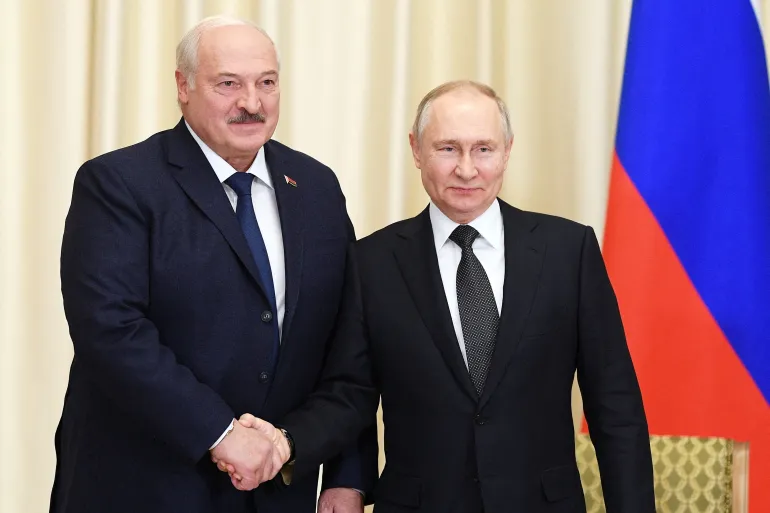Belarusian President’s remark follows pact allowing Russian deployment of weapons in the country.
Belarus President Claims Russian Transfer of Nuclear Warheads as Pact Allows Moscow to Deploy Weapons
During the Eurasian Economic Forum in Moscow, Alexander Lukashenko, the leader of Belarus, announced that Russia has initiated the movement of tactical nuclear warheads to Belarus for storage.
Lukashenko stated that preparations were made to accommodate the weapons in Belarus, and it is possible that the warheads have already arrived.
This revelation follows the signing of a pact between Russian and Belarusian military officials, permitting the deployment of tactical nuclear weapons in Belarus.
The pact marks a significant shift in Russia’s nuclear posture and could escalate tensions in Belarus amidst potential future instability.
The decision to station tactical nuclear weapons abroad is the first of its kind for Russia since 1991.
Russia intends to maintain control over these weapons, which can be launched from Iskander-M missiles or Su-25 planes, both of which Belarus possesses. With its proximity to three NATO countries and possession of missiles capable of reaching several capitals, Belarus’s involvement raises concerns.


The transfer of weapons will further align the militaries of Russia and Belarus, as Russia seeks closer ties with Minsk, potentially jeopardizing Belarusian sovereignty. Additionally, Russia anticipates a possible counterattack from Ukraine, which could put Moscow on the defensive in the ongoing 15-month-long war.
The Wagner group, a Russian paramilitary organization, has announced the withdrawal of its forces from the city of Bakhmut, handing over their positions to the regular Russian army. The situation remains tense, with expectations of Ukraine launching a counteroffensive that could challenge Russian military gains.
Amidst the developments in Ukraine, Prigozhin, an ally of Vladimir Putin, criticized the Russian military for neglecting his troops and accused them of causing significant casualties.
Meanwhile, Russian militias aligned with Ukraine carried out a cross-border raid, resulting in clashes in the Belgorod region, representing some of the most sustained fighting on Russian territory since the conflict’s start.
The Ukrainian government denied any connection to these fighters. Moreover, a recent drone attack on the Kremlin, captured on video, prompted accusations between Russia and Ukraine, with US spy agencies suggesting Ukrainian involvement.
However, Ukraine’s presidential adviser dismissed the notion of a significant change in the conflict dynamics, emphasizing the complexities and ongoing nature of the situation.
The signing of the pact between Russia and Belarus to deploy tactical nuclear weapons is a significant escalation of the conflict in Ukraine. The deployment of nuclear weapons to Belarus would put them within striking distance of several European capitals, and would raise the stakes of any future conflict between Russia and NATO.
The withdrawal of Wagner group units from Bakhmut is also significant. The Wagner group is a Russian mercenary group that has been heavily involved in the fighting in Ukraine. Its withdrawal suggests that Russia is facing increasing difficulties in the war, and may be preparing for a withdrawal from some areas of Ukraine.
The cross-border raid by Russian militias into Belgorod is a further indication of the growing instability on Russia’s borders. The raid is likely to further increase tensions between Russia and Ukraine, and could lead to further escalation of the conflict.
The drone attack on the Kremlin is a worrying development. The attack is a clear sign that the conflict in Ukraine is not limited to the battlefield, and that Russia is now facing threats from within its own borders. The attack is also a reminder of the potential for the conflict to escalate into a wider war.
The situation in Ukraine is extremely volatile, and it is difficult to predict how the conflict will develop in the coming weeks and months. However, the developments outlined above suggest that the conflict is likely to continue to escalate, and that the risk of a wider war is increasing.
SOURCE: THE GUARDIAN AND NEWS AGENCIES


